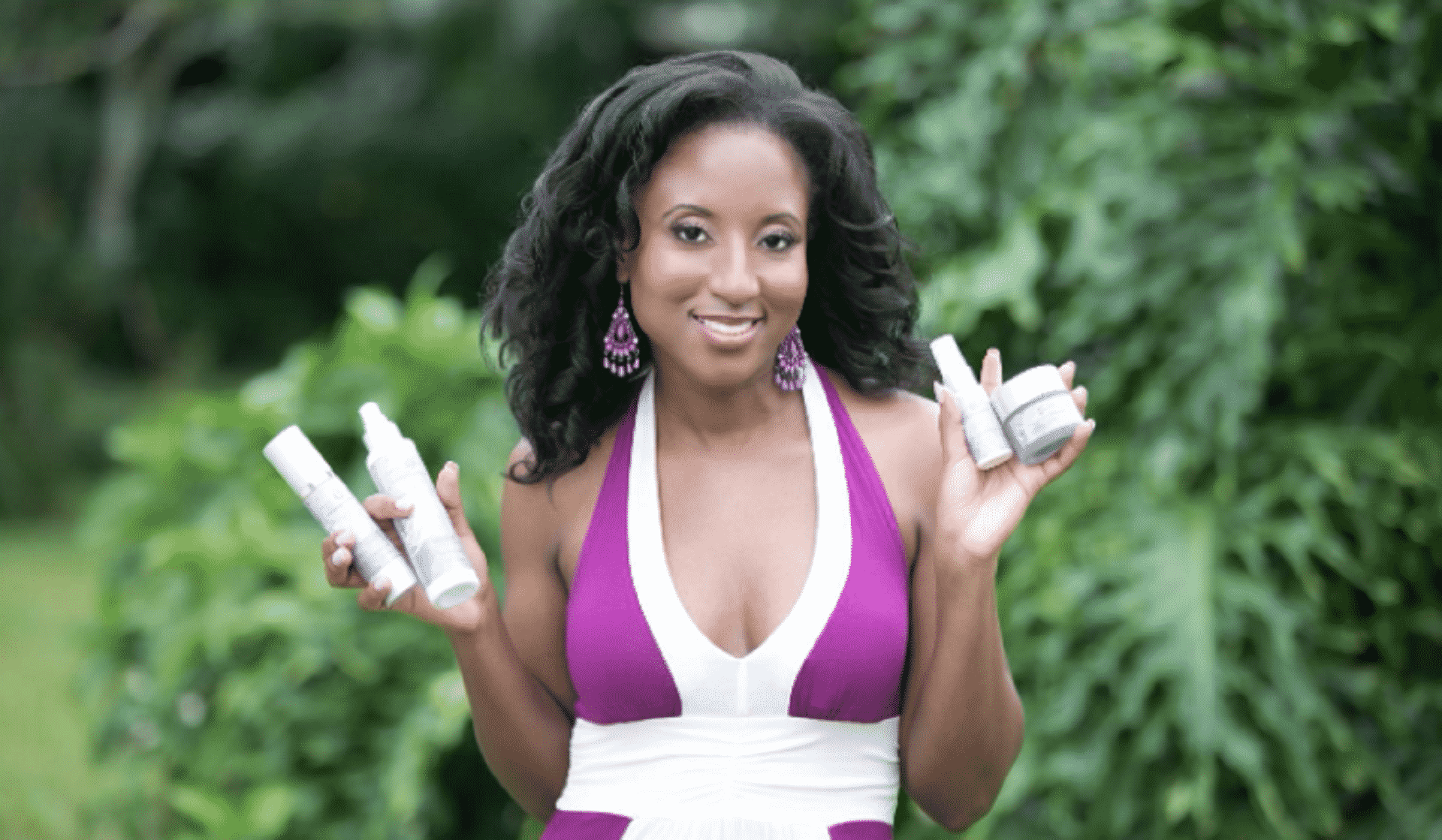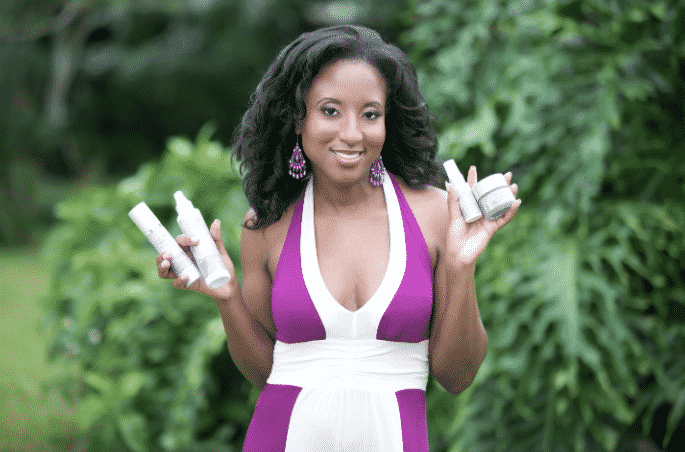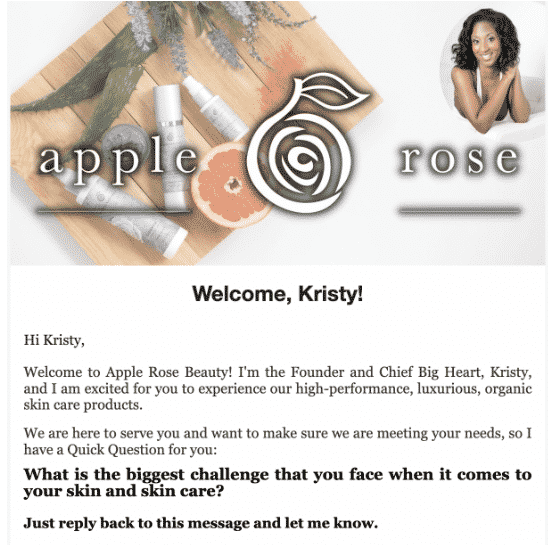

“I went into corporate America for about 10 years and was on the fast track, being promoted every couple of years,” Apple Rose Beauty founder Kristy Alexander told us. “I was up for another promotion when I decided to travel around the world. I found myself in Thailand, volunteering with an organization that helped rescue women from human trafficking. That really changed the direction of my life.”
While in Thailand, Alexander met two survivors of human trafficking, Apple and Rose. She founded her cosmetics company in 2015, naming it after the women to honor them and highlight a larger mission — to help stop human trafficking. Alexander employs human trafficking survivors and supports organizations that rescue and rehabilitate women like Apple and Rose.
Apple Rose Beauty, headquartered in Jacksonville, Florida,is a luxury skincare company. Its organic face care products are formulated for people with sensitive skin. “I developed the products for my own skin,” said Alexander. “I have sensitive skin and I’m also sensitive to fragrances. I wanted to create a natural line that was lightly scented or had no scent at all and gentle for sensitive skin, but still very effective.”
Alexander credits her dream of opening a cosmetics business to a chemistry class she took at age 15 in her native country of Trinidad and Tobego. While taking the class, she analyzed cosmetics and discovered it was something she really enjoyed.
Using email to build strong customer relationships
When started the company, Alexander knew she needed a strong email marketing strategy. She wanted a flexible, scalable email marketing system with built-in automation features. She chose ActiveCampaign, a marketing automation platform that includes email marketing and CRM capabilities.
“The technology brings together what people think of as email marketing, marketing automation, and CRM,” explained Maria Pergolino, ActiveCampaign’s CMO. “We bring these technologies together with robust automation so that companies can run campaigns and elevate their voice to multiple audiences.”
“I was looking for something that was flexible in terms of automation and communicating with my customers,” said Alexander. “ActiveCampaign stood out from other CRM companies that had rigid automations which didn’t allow me to think about flexible ways to communicate with my customers using ‘if…then…else’ scenarios. The other piece was that I needed a platform where I could own and grow my customer relationships.”
In the early days of growing her business, Alexander worked with an advisor and tried several CRM tools. “I’m probably one of those people who tried them all,” she said. “We kissed a lot of frogs first before we got here.”
Five years later, having built a robust email list, Alexander faced another challenge — reaching customers accustomed to touching and feeling her products during a time when this became impossible — the pandemic.
Using technology to strengthen offline customer relationships
Alexander uses ActiveCampaign for email marketing, but she also leverages its Facebook integrations to automatically upload her customer list for Facebook paid advertising. She’s able to customize campaigns on Facebook with messaging that’s tied to customer behavior.
When COVID-19 hit, Apple Rose Beauty was doing most of its business offline through partnerships with retailers like Macy’s, local marketplaces, and other physical locations. Alexander’s strategy of cultivating strong offline customer relationships helped her rapidly pivot to the online space. Prior to the pandemic, online sales were only about 30% of her business.
Said Alexander, “I’d always heard of the importance of email marketing, but it was never my focus prior COVID. We onboarded our customers from whatever channels that we got them and we tried to get their email addresses so could remarket to them. We did a lot of in-person activation in store and in markets.”
In-person feedback helped Apple Rose Beauty home in on who their customers were — the people who were really drawn to the brand. This gave Alexander and her team a solid understanding of their customers’ challenges and pain points which informed the development of the brand positioning.
“When COVID hit, I hadn’t realized how much that in-person feedback was beneficial for our brand or how much it informed our entire go-to-market strategy. Post-COVID, we missed that instant feedback. We were still sending emails, but they were the traditional one-way communication. And we thought, how can we recreate this type of relationship that we originally had with customers interacting with them in person?”
Making email conversational
The inability to communicate with customers in person inspired Alexander and her team to rethink how they were using automation and specifically how they were leveraging ActiveCampaign. They transitioned to a more conversational type of email marketing, asking customers to reply back to them.
“When COVID hit, we were in this state of not knowing what was going on. We were used to seeing our customers and so we were really wondering how they were doing and how they were dealing with the pandemic. That’s what our initial emails were about — just reply back and let us know how you’re doing. What do you need?”
Asking customers how they were doing helped kick off the process of transitioning Apple Rose Beauty from offline to online sales. Their customers knew the company had a website, but they were used to buying in person at Macy’s or local markets in Jacksonville, or in Atlanta where Alexander is based.
“With skincare, it’s very touchy feely, it’s giving customers an opportunity to smell the product and see how it spreads on their skin,” said Alexander. “So, we were a very high touch company pre-COVID, both locally and throughout the U.S.”
Get the daily newsletter digital marketers rely on.
Skyrocketing online sales and a new business approach
With the focus on e-commerce and a new personalized email communication strategy facilitated by ActiveCampaign, Apple Rose Beauty was able to grow their online sales by 300% in 2020. “We were able to develop a type of relationship with our customers that a lot of retailers aren’t necessarily able to in an online setting. They really feel like we care. And it’s not just marketing or promoting to them, but they feel like they can have a conversation with us,” said Alexander.
Alexander notes that about 70% of the business is now online, a complete flip from pre-pandemic times. While they’ve begun a slow return to in-person events, she has no plan to return to the way it was before.
“We can scale a lot more with email marketing and with online sales, she said. “We’ve also transitioned our acquisition model to using more paid advertising and online advertising. Where once our new customers were coming from those in-person markets, we’ve now transitioned to online customer acquisition.”

This strategy has enabled Alexander’s small team of three to achieve six figures sales annually and continue to grow. She credits the strong relationship she’s built with her customers—plus her focused digital transformation strategy — for this success.
“Customers are the lifeblood of the company, right? If you don’t have customers, you don’t have a business. Pay special attention to that customer relationship because that’s very important to nurture and to maintain. You want to make sure that, as a brand, you have control over communication and messaging so you can stay focused on nurturing that relationship.”
Read next: More case studies from Jacqueline Dooley






